The Truth Isn't Out There: Religion and Belief in Aliens
This post has been unlocked through a generous grant from the Lilly Endowment for the Association of Religion Data Archives (ARDA). The graphs you see here use data that is publicly available for download and analysis through link(s) provided in the text below.
The “odd story of the week” in the days leading up to Christmas this year was about a whole bunch of unidentified drone-like objects that were hovering in the sky in densely populated areas. There were some examples of grainy videos posted on social media of these unidentified flying objects, but no one could really figure out what they were, not even President-elect Donald Trump.
People were obviously looking for answers to the origin of this phenomenon and an easy explanation is always aliens. When Josh Hawley was asked about that possibility on Fox News he said “anything is possible.” It seems like aliens are always a topic that is simmering on the back burner of the discourse in American society. Just about a month before the drone sightings Congress held a full blown hearing about UFO sightings. The title was a bit ominous: Unidentified Anomalous Phenomena: Exposing the Truth.
One of my pastor friends was asking about belief in aliens the other day and my first thought was - that’s a good idea for a post, provided I can find some data on that. Well, the Association of Religion Data Archives (ARDA) delivers once again. I just did a quick query using their helpful search tool and found a number of surveys that fit the bill. The one I wanted to focus on is actually a series called The Chapman Survey of American Fears. The specific survey I am using comes from Wave 2, which was fielded in 2015 and Wave 7 which was collected in 2021.
I wanted to focus on two questions about aliens visiting Earth. One asked if folks believed that this had occurred in the Ancient Past, another asked about aliens visiting in Modern Times. Let’s see how those answers have shifted between 2015 and 2021.
It’s certainly the case that the average American seems more open to the idea of alien encounters in 2021 compared to the same question asked six years earlier. For instance, about 70% of folks rejected the idea of contemporary alien encounters in 2015. In 2021, that had dropped by about five points. On the issue of an ancient visitation, things moved even more. Only 33% agreed that something like that had occurred in 2015 - that rose to 42% in data collected in 2021. I definitely think it’s fair to say that the average American is more receptive to the idea that non-Earthlings have visited this planet, either in the recent or distant past.
But, let’s dig below the surface. There’s certainly reasonable to assume that belief in alien encounters is related in one way, shape or form to religiosity. I wanted to spend some time trying to pull that apart.
In 2015, about 77% of Protestants rejected the idea that aliens had visited the Earth in modern times - that was the highest percentage of any religious group. However, those of “Other Faith” were just a bit behind at 72%, while the non-religious clocked in at 68%. The religious group that seemed the most open to the idea of an alien encounter were Roman Catholics - only 61% disagreed that “aliens visited Earth in modern times.”
For the two Christian groups in this sample, there’s clearly been a shift toward the idea of aliens. While just 22% of Protestants were in favor in 2015, that jumped to 32% in the 2021 survey. For Catholics that number was 45% - easily the most receptive religious group when it comes to the idea of aliens. On the other hand, those of other faith groups and the non-religious were most skeptical of aliens. From this angle, I don’t know if I can say with any certainty whether there is a strong connection between religion and openness to aliens.
Let’s try a belief measure here - this one asked about a respondent’s view of the Bible.
The first thing that I wanted to point out was the fact that there’s been an overall shift toward the idea of aliens visiting the Earth. You can see it in every category. It’s especially apparent among the share who said “strongly disagree.” For biblical literalists, that share dropped 18 points, and it was 23 points among those who said that the Bible was a “book of history and legends.” Again, the big story is how far the country has moved toward accepting the idea of aliens.
But the other thing that I need to point out is that there’s a clear relationship between how an individual views the Bible and how they view the idea of alien encounters. The group that is most skeptical of extraterrestrials are biblical literalists. It was only 20% in agreement in 2015 and that rose to only 25% in the data from 2021. That was easily the lowest percentage. Among those who said that the Bible was true but shouldn’t be taken literally it was 34% and it was nearly 40% of people who said that the Bible contained some human error. So, to me, this graph is building a case that religiosity is negatively related to views of alien encounters.
To this point we have measured religious belonging and religious belief, but what about religious behavior? Let’s take a look at church attendance now.
Well, okay - now things are really coming into sharper focus. If I were to describe this graph simply it would be - religious attendance doesn’t matter, until it really does. There’s no statistical difference in the answer to this question when comparing those who never attend religious services to those who attend church about once a month. The numbers hover around 45-50% when considering the question of aliens visiting the United States in the ancient past. There does seem to be a consistently lower score on the question of aliens visiting in modern times.
But then we come to those in the sample who report attending religious services nearly every week or more. They are significantly less likely to believe aliens have visited Earth. For instance, only 24% of them say that aliens have visited in the ancient past. That’s about half the rate of those who attend once a month. Just 19% of weekly attenders say that aliens have visited Earth in modern times, again, that’s about half the rate of everyone else.
This brings the discussion into much clearer focus - religion seems to be negatively related to views of aliens.
But you know what would bring us much closer to a definitive answer to this question? A regression analysis. That’s what I did. I threw a bunch of control variables in my model: race, education, age, and gender. Then I tossed in a measure of political ideology, then three questions about religiosity that measured belonging, belief, and behavior. A positive coefficient means that this model predicts a greater likelihood of alien encounters.
Well, this model is not really going to blow anyone’s mind. Many coefficients are not statistically significant (because they overlap with zero). However, there are some important factors. Education is negatively related to a belief in alien encounters, which I guess makes logical sense. In 2015, white folks were less open to the idea of aliens. That wasn’t the case in 2021 - there was no relationship. In the 2015 model, older people were more skeptical of alien encounters but in 2021 that relationship wasn’t statistically significant anymore.
What about those religion variables? Well, I think they really solidify the story that we saw in the histograms. In the case of both biblical literalism and religious attendance, the relationship is negative. More religious people tend to be less likely to believe in alien encounters, all things being held equal. For religious belonging, there was no relationship in the 2015 data. However, in the 2021 survey the non-religious were less open to the idea of aliens compared to folks who aligned with a religious tradition.
But notice what didn't appear here? There’s not a single coefficient that is signed in the positive direction and is statistically significant. That means that I can’t find anything that systematically makes someone more open to the idea of alien encounters. I could point to a handful that work in the opposite direction, but nothing that is clearly on the positive side of the ledger.
There has been some good academic work on this topic, for those interested in learning more. Paranormal America: Ghost Encounters, UFO Sightings, Bigfoot Hunts, and Other Curiosities in Religion and Culture by Bader, Baker, and Mencken is a good book-length treatment. That same authorship team also published A Bounded Affinity Theory of Religion and the Paranormal in the Sociology of Religion back in 2016.
Looking at this in totality, I just don’t find any way to parse this data to come to the conclusion that religion is positively related to a belief in aliens. I think the data is definitely suggestive of the idea that religious people (however it is measured) tend to be slightly less inclined to the idea of life on other planets visiting ours.
The truth maybe isn’t out there - it’s right here.
Code for this post can be found here.




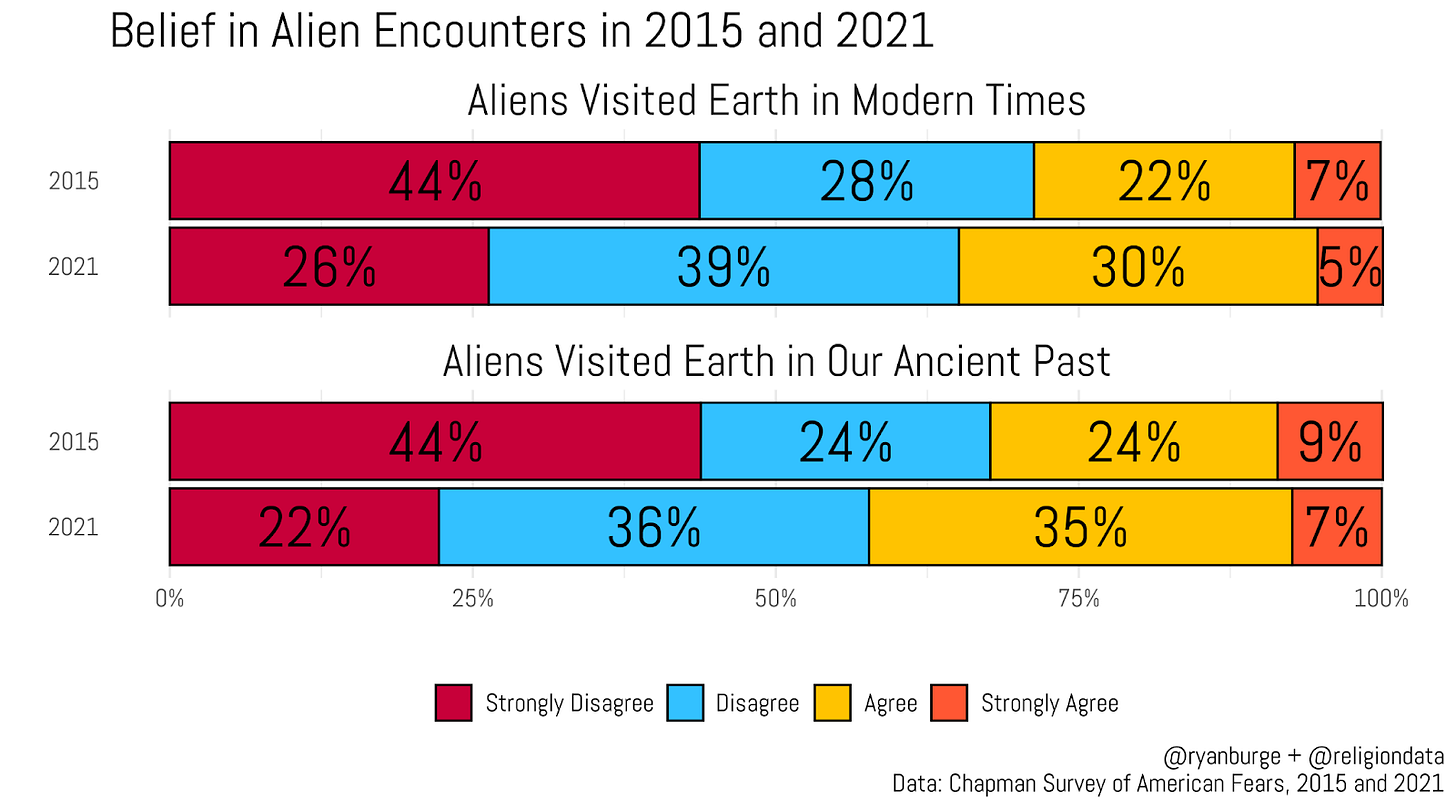
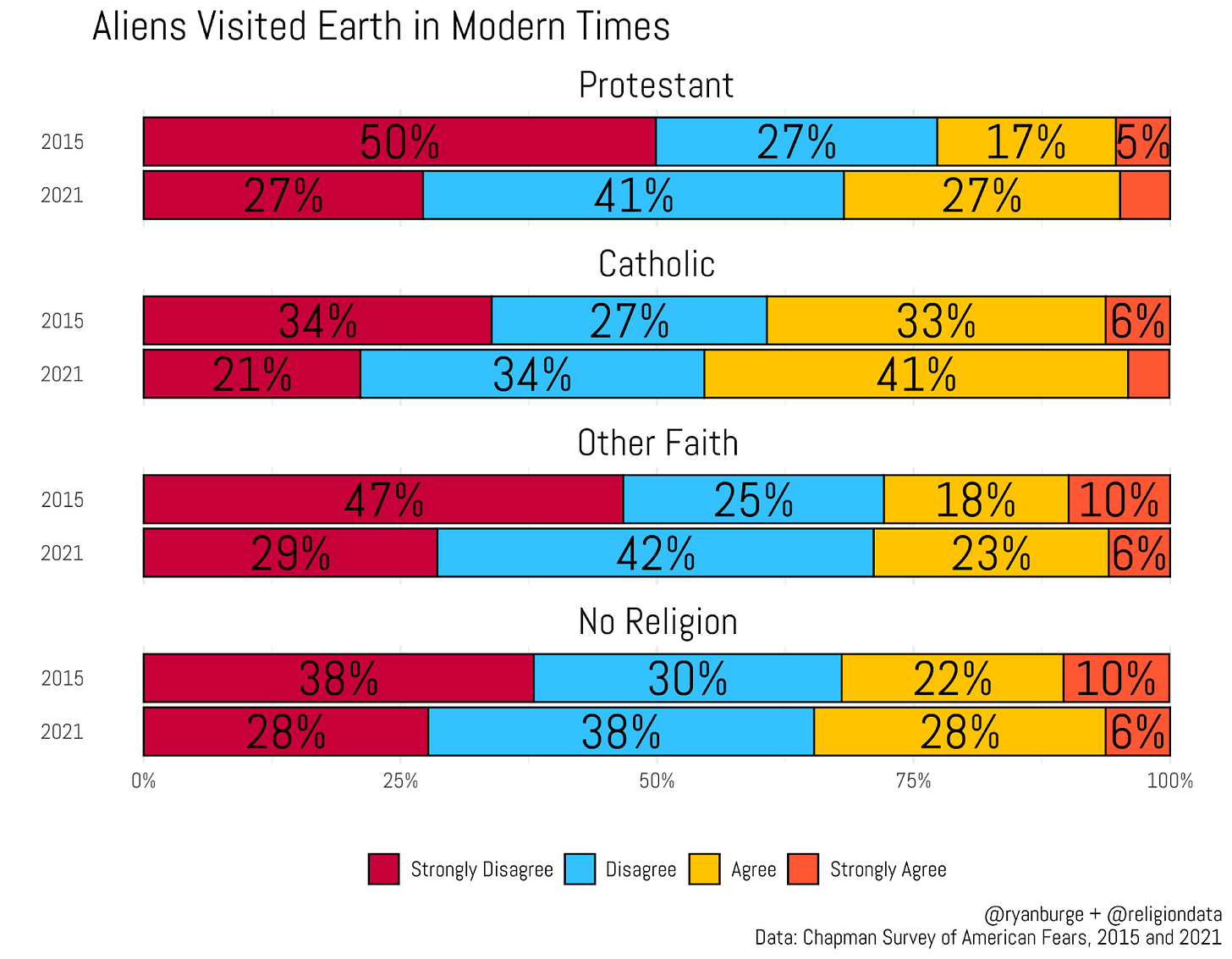
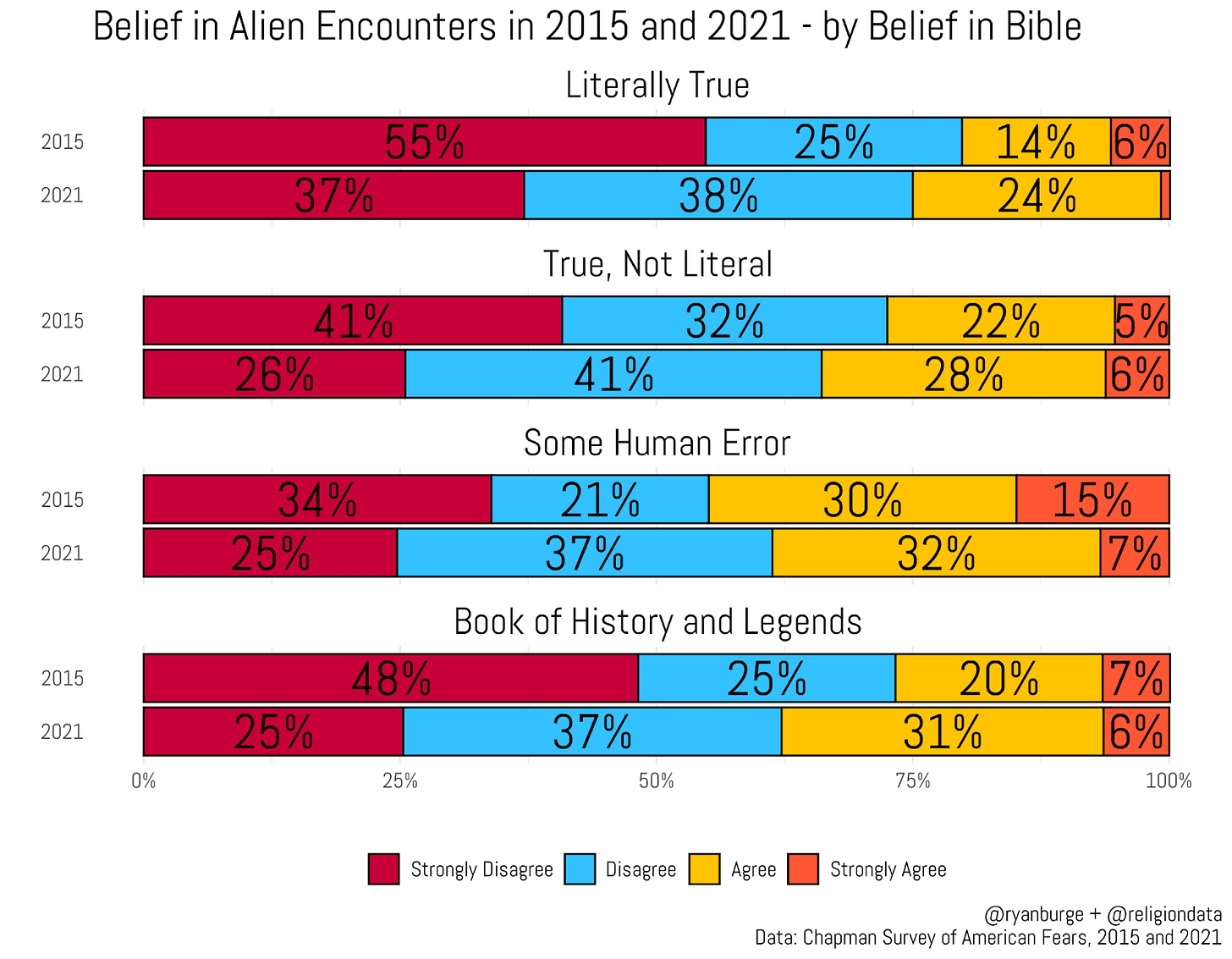
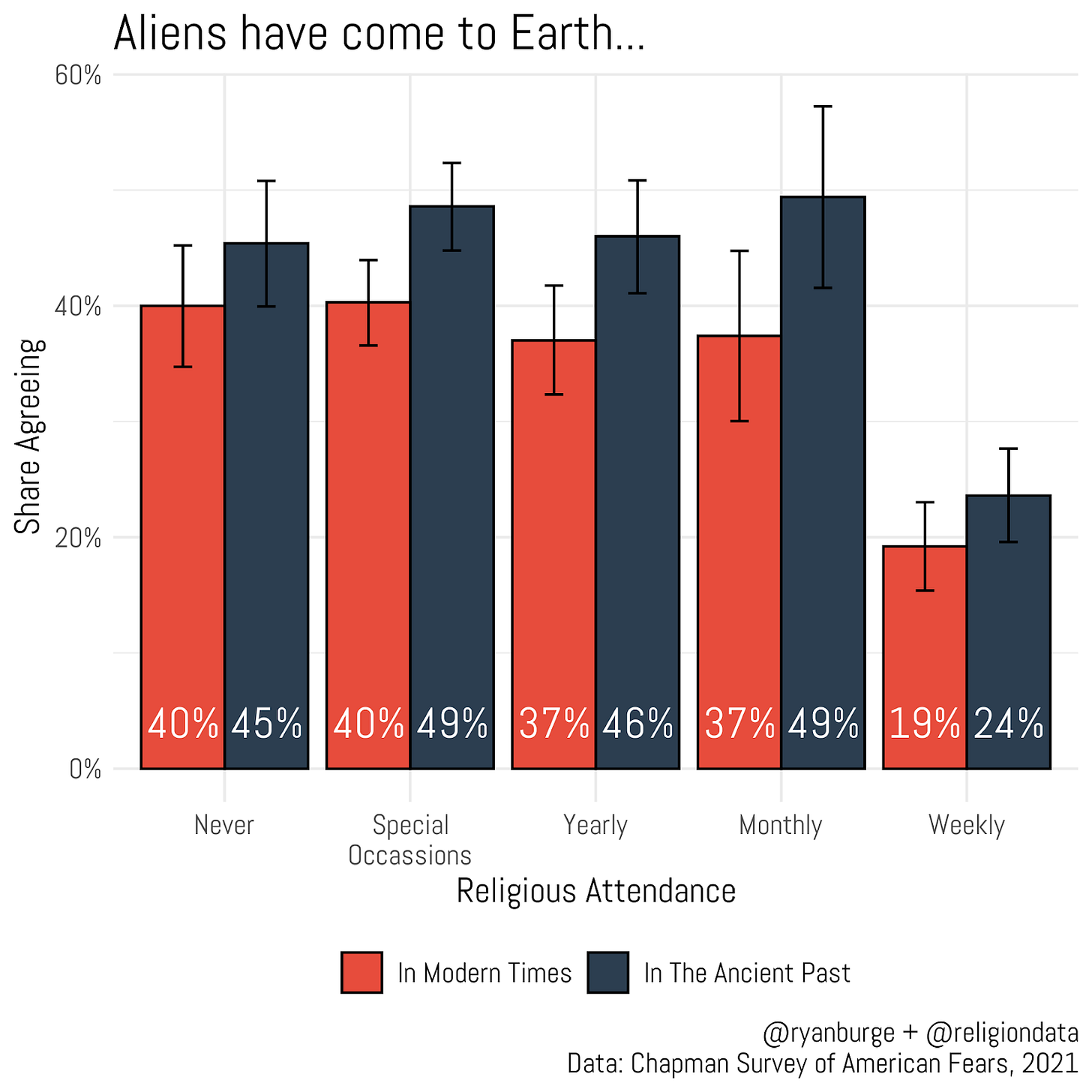
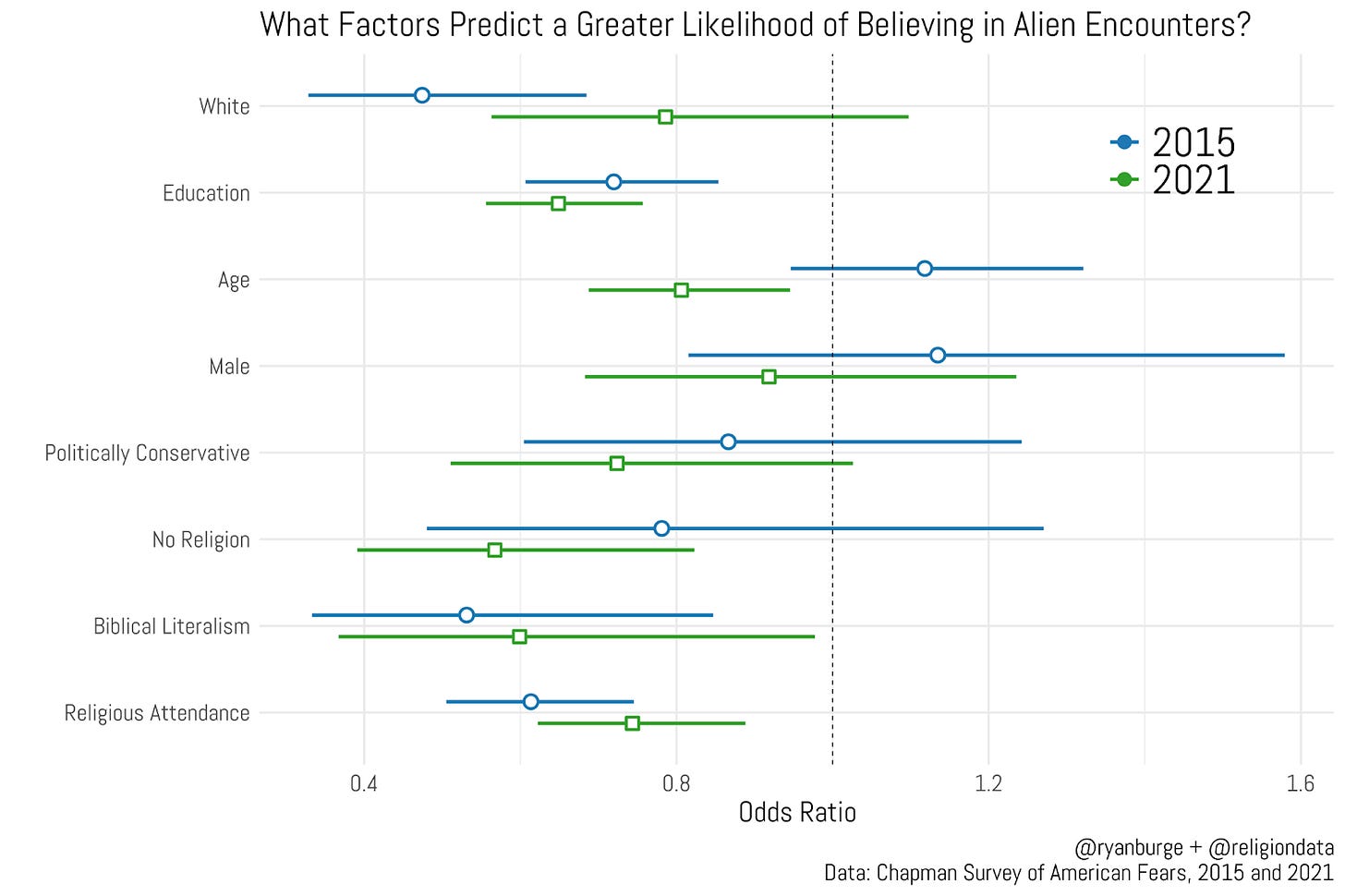
Data interpretation question. Maybe a dumb question. You say that being white and more religious are variables that make people less likely to believe in alien encounters, but there aren’t any variables that point toward higher belief in aliens. Wouldn’t “non-white” and “less religious” be variables that point to higher belief in alien encounters?
I would think if you could get at more specificity with the "nones", you'd find a sharp contrast between the atheists/agnostics and the nothing-in-particulars. I thought that was usually how these things went: there's a horseshoe where the firmest believers and the atheists generally reject the most New Age ideas.
Belief in the existence of intelligent extraterrestrial life isn't necessarily New Age (though it can be), but belief that such creatures have visited and/or continue to visit earth absolutely is, in practice.
Though it seems (and IIRC we saw this before) there is a cluster of people that check the "Biblical literalist" box but don't actually attend church that much and, I strongly suspect, probably don't read the Bible or engage in much other Christian practice either. They're therefore going to be more open to syncretizing New Age ideas with their understanding of Christianity.